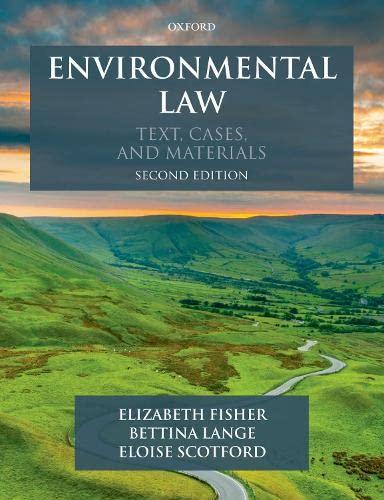Question
Our client, Mr. Wise, believes that he is a victim of an over-reaching SEC. Mr. Wise has been accused of violating the insider trading provisions
Our client, Mr. Wise, believes that he is a victim of an over-reaching SEC. Mr. Wise has been accused of violating the insider trading provisions of the Securities and Exchange Act. The SEC has accused Mr. Wise of communicating material non-public information to his sister and mother and that they traded stock on the basis of that information. Here is Mr. Wise's story.
Mr. Wise is chairman and CEO of Cars Corporation (Cars) which owns and operates a number of automobile repair stations. Two years ago (2002) he becomes interested in buying Oil, Brakes and Such, Inc., (OBS) another corporation that operates stores which change oil, fix brakes, and conduct other minor auto repairs. In confidential discussions with OBS on July 12, Wise and OBS's CEO discussed a potential acquisition price of $48 per share. Wise also learns OBS is in discussions with other suitors. Mr. Wise indicates there was some public information that OBS was having some discussions about a possible sale. On July 15, Wise visits with his financier and the next day he signs a confidentiality statement so they can receive OBS's financial statements for review. They get the financial statements on the 17th. Wise is reminded on July 24th that bids for OBS are due on July 26. He submits an offer on that day, but the deal subsequently falls through. On August 5, 2002, OBS announced its merger with a different company.
Mr. Wise continued his efforts to expand and last March on the 20th he met with executives of KureCo and Best Tire, Inc. During the meeting on the 20th the potential for Best Tire to buy KureCo was discussed. Wise's purchase of Best Tire was completed shortly after this meeting. A confidentiality agreement with KureCo was signed on April 7th and due diligence began. Mr. Wise met again with an executive from KureCo on June 16 where he was encouraged to call KureCo's CEO to further discuss the purchase. Mr. Wise learns he will have to act quickly because KureCo is in discussions with other suitors. On July 14, 2003, Wise made a tender offer of $11 per share to acquire KureCo.
The problem arises because of Wise's phone calls with his sister and mother. The SEC is interested in the following 2002 events. July 14, Wise calls his sister (Mary) and the next day Mary purchases shares in OBS. Mary visits with her mother (Jane) several times over the next few days and they talk about OBS. Wise called Mary on July 18 and 28, and he called his mom on the 25th of July. Wise tells me he often calls his sister and mom to catch up on family matters and to see how they are doing. In fact, Wise calls his sister and mother several times over the next year, but he indicates the SEC is particularly interested in the June 16, 2003 phone call from his cell phone to Mary.
Following is information Mr. Wise provided about his mom's and sister's stock investments. Jane purchased some OBS shares on the 16th and the 29th of July. Mary buys some more OBS shares on the 25th, 26th, and 29th of July. Mary's OBS stock was worth $575,009, and Jane's was worth $361,026 by August 5, 2002. Mary bought KureCo shares on June 17, 2003, and sold some a month later (July 16), and tendered the rest. She made about $726,000 on the KureCo stock.
Mr. Wise claims he did nothing wrong and that Mary often follows the auto repair industry news, making investments when appropriate. But, the SEC is still alleging a Section 10(b) and Rule 10b-5 violation (along with some other violations). Please review those sections of the Securities Act of 1934 and let know what they are intended to accomplish. I also want to know the strength of the basis for the SEC's allegations, so you should also review some recent U.S. Court of Appeals cases. I seem to recall there was a very recent decision that may provide us guidance.
Answer the following questions in memorandum format: How should we be advising Mr. Wise (from a legal and ethical standpoint)? Do you think we'll lose if we go to court? If so, what might be the consequences?
(Research tips: Using either Findlaw (https://www.findlaw.com/), the U.S. House Internet Law Library U.S. Code search form (https://uscode.house.gov), find the 1934 Securities Exchange Act (15 U.S.C. 78(j)). Relevant SEC regulations can be found at https://www.ecfr.gov/. Use the Lexis-Nexis legal search engine available through the portal for the campus library to find the appropriate court decision.) Information about memorandum formats is at https://owl.purdue.edu/owl/subject_specific_writing/professional_technical_writing/memos/format.html.
Step by Step Solution
There are 3 Steps involved in it
Step: 1

Get Instant Access to Expert-Tailored Solutions
See step-by-step solutions with expert insights and AI powered tools for academic success
Step: 2

Step: 3

Ace Your Homework with AI
Get the answers you need in no time with our AI-driven, step-by-step assistance
Get Started


